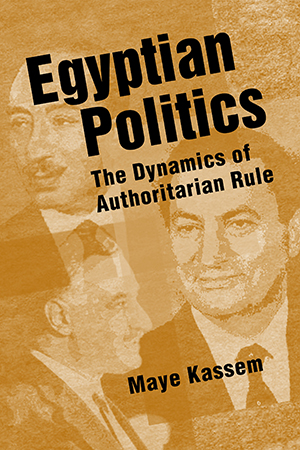Though the regimes of Egyptian presidents Nasser, Sadat, and Mubarak have been decidedly different, the nature of personal authoritarian rule in Egypt has remained virtually unchanged across more than five decades. Maye Kassem traces the shaping of contemporary Egyptian politics, considering why authoritarian rule has been so resilient and assessing the mechanisms that have allowed for its survival.
Kassem begins with the military coup d'etat of July 1952, moving from the single-party system established under Nasser to the current framework in which opposition parties are legal. Along the way, she explores the legacies of Mubarak's predecessors, the functioning of the legislature and judiciary vis-à-vis the president, the roles of political parties and civil society, and the impact of authoritarian rule on the development of extremist Islamic groups. She concludes by reflecting on the long-term effects of authoritarianism on national development, stability, and Egypt's place in the international arena.
Maye Kassem is assistant professor of political science at the American University in Cairo. She is author of In the Guise of Democracy: Governance in Contemporary Egypt.
"A vital tool to understanding the background to [the 2005 presidential elections] and why Egyptian elections are not (and have never been) an indicator of democratization. Indeed, for those interested in enhancing their knowledge of what goes on inside the black box of Egyptian domestic politics, Maye Kassem's book will prove an indispensable resource. Thorough enough to teach the seasoned student of the Cairo scene a thing or two, Egyptian Politics, with its concise style and colorful case studies, takes pains to remain accessible to the layperson as well."—Debra Shulman, International Journal of Middle East Studies
"Clear, accurate, and very readable ... an excellent introduction to modern Egyptian politics.... Highly recommended."—Choice
"A thought-provoking and lively treatment of a complex topic.... With any luck, [Kassem's] efforts will spur still more scholarship on a topic which remains only incompletely understood."—Jon B. Alterman, Middle East Journal
"Kassem weaves a picture of the resiliency and durability of 'personal authoritarian rule' throughout fifty years of Egyptian politics.... She provides a compelling and accessible explanation of why democracy is stillborn in Egypt today, and why we shouldn't expect the situation to change."—Diane Singerman, American University






